The Interpol has issued two Red Notices against criminals Kapil Sangwan alias Nandu and Vikramjeet Singh both associated with the infamous Lawrence Bishnoi gang.
Sources in the National Investigation Agency (NIA) said that these gangsters are operating the gang from abroad. Both of them fled from India and reached foreign countries, continuing the network of the Bishnoi gang.
Advertisement
There is suspicion that Vikramjit Singh, also known as Vikram Barad, is hiding in Dubai, while Kapil Sangwan is believed to be hiding in Britain.
Sangwan is also on the radar of Delhi Police Special Cell in connection with a number of criminal cases and gang-wars that took place between rival groups.
The NIA recently raided a number of locations belonging to both the criminals in separate cases. The gangsters had also created ‘Mahagatbandhan’ with other gangs. In the gangsters’ Mahagatbandhan the group A was of Neeraj Bawana.
“In Neeraj Bawana’s Mahagatbandhan there are Saurabh alias Gaurav, Suvegh Singh alias Sibbu, Subham Baliyan, Rakesh alias Raka, Irfan alias Chhenu, Ravi Gangwal and Rohit Chaudhary and Davinder Bambiha Gangs,” the source said.
Lawrence Bishnoi’s Gathbandhan (team B) included Sandeep alias Kala Jatehdi, Kapil Sangwan alias Nandu, Rohit Moi, Deepak Boxer, Prince Tewtia, Rajesh Bawania and Ashok Pradhan.
These two Mahagathbandhans of gangsters had created havoc in many states and were also indulging in gang wars, said sources.
As per Interpol, Red Notice is a request to law enforcement worldwide to locate and provisionally arrest a person pending extradition, surrender, or similar legal action. It is based on an arrest warrant or court order issued by the judicial authorities in the requesting country. The member countries apply their own laws in deciding whether to arrest a person.











